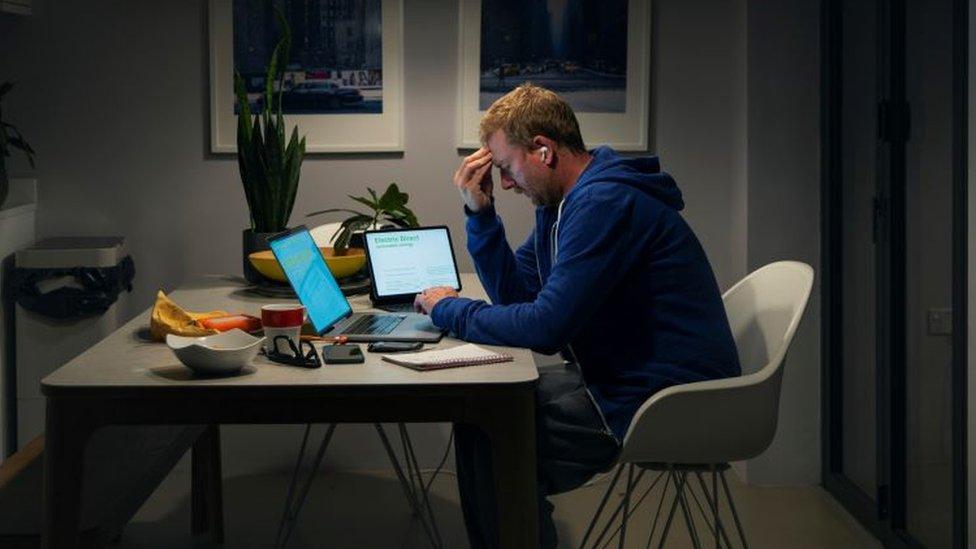Feeling financially vulnerable?
- Published

It is reckoned that most of us run close to the edge with money at some point in our lives. The financial sector is under pressure from its regulator to provide help through crisis, and to stop excluding people from its services.
Technology opens up the market to more choice and cheaper products. Big data can predict problems before you know you have them. But it can also work to marginalise those already facing difficulties.
Scotland's financial sector has a new plan to pull people into discussing their life crises and ways through them financially, sharing information across providers. But can you trust them?
We probably covered compound interest. And as I recall in third year of secondary, our maths teacher, Miss White, taught us how to fill in a cheque.
That was the extent of my financial education at school. Despite the job title, I continue to navigate hidden shallows in my personal finances.
I'm not alone. According to the Financial Conduct Authority (FCA), Britain scores poorly among the OECD club of developed economies for its financial literacy.
If you have a decent regular income and savings in reserve, you can get away with a certain amount of financial ineptitude.
You can't do that if you are financially precarious or vulnerable; if you are:
the one in 30 Scots who do not even have a bank account: a higher proportion than the UK (3% versus 2.1%), but lower than the one in 10 British Muslims and one in 14 unemployed people
within the 43% of adults in Scotland who could not cover living expenses for three months if you lost your source of income, three percentage points higher than England
the one in 12 who responded to an FCA survey earlier this year that they are already in financial difficulty
the one in 14 who pay everything, or nearly everything, in cash
the 73% of women who are facing domestic abuse who find it more difficult to leave their abuser because of the cost-of-living crisis. Almost all cases of financial abuse include a financial element of control
one of the majority who do not feel positive about their financial situation, according to a report for Standard Life, which also indicated only 61% feel confident making financial decisions, and 59% worry about running out of money.
Long-term illness

Financial vulnerability is not pre-determined or permanent. People move in and out of it, but it is reckoned that most of us are financially vulnerable at some point in our lives.
With real earnings dropping for many as prices have risen, that vulnerability has become worse.
Students graduate with debts far greater than their parents had to manage a generation ago.
Adults aged under 25 are twice as likely to lack a bank account than those aged above.
There has been growth in precarious and gig employment, with income fluctuating, and uncertainty about future earnings making it harder to get credit.
The cost of getting on the property ladder puts it out of reach of many, making a younger generation asset poor, as the private rental sector grows, rents go up, and the cost of starting a family is daunting.
A record share of the potential workforce is "economically inactive" due to long-term illness. NHS waiting lists keep many in that position.
The financial sector is concerned about this getting worse, as people reach retirement and find their pensions are not sufficient to support them.
As many more people move into very old age, life savings are stretched further.
And where you want a human to talk to about this, bank branches have closed.
Confidence with numbers
The better news is that the financial sector is thinking quite hard about what it can do to help. For some, it's in their financial interests to sell more savings and pensions products.
But all of the sector is under pressure to tackle financial exclusion from the FCA, and to improve the support they give to vulnerable customers. The regulator's chief executive, Nikhil Rathi, was in Glasgow on Friday to make the case for deeper engagement still.
Getting to those who lack a bank account is an important start. "It can only be tackled through a combination of measures," he told me, "making interaction with the financial services industry as seamless as possible, with points of contact where people do not know what's involved in opening a bank account, proactive steps to help people open bank accounts, assisting where they may have problems proving their identity, and there's work to do with young people around confidence with numeracy."

Other countries take other approaches, and can be more successful. France provides a legal right to a bank account. The courts there can require a bank to provide an account to someone who has difficulty in getting access.
That issue of proving one's identity, with a stable home address for instance, is addressed in other countries with a digital identity code, but Rathi points out there are privacy and cost issues there. ID cards have been considered, but many in Britain perceive them as an infringement of liberty.
The obstacle of proving the source of funds, to tackle money laundering, requires a balance of regulation with flexibility.
Safe spaces
The driver of much of the change is financial technology or fintech, which offers both opportunities and challenges.
It can open up affordable and convenient financial services to more people. Open banking lets people put their data into the market place where the data can do the work in seeking out the best deals.
Fintech offers platforms that help people understand where their money is being spent. Software, some developed in Scotland, is available that helps people navigate the benefits system to ensure they are getting all the income to which they're entitled.
But it also opens up opportunities for scammers. And Nikhil Rathi points out that it can be a means of exclusion. For instance, while the majority can get low-cost travel insurance, those with a potentially expensive health condition can find it more difficult to get cover.
"As bigger sets of data are used, there's the opportunity for products like insurance to become hyper-personalised,". he says. "That could mean, in certain categories, insurance becomes cheaper for a large number of people but for some people, for those with the most risk, it could become prohibitively expensive to have insurance in certain aspects of their lives.
"Those are the risks of financial exclusion. We want to make sure firms are thinking about those, collecting data, and that we have an open debate about how we strike this balance between use of technology to personalise and the effect on those who might be left behind."
That is where there is a tension for the FCA in being the regulator, cracking down on risky behaviour, but also an encourager of innovation.
So it creates "safe spaces" for regulated firms to test new ideas. And among the more challenging prospects is the way in which the industry intends to share information.
Financial confessional

That is already possible through open banking, with your permission as a customer. But the strategy set out last week by Scottish Financial Enterprise, the trade body based in Edinburgh, working with Standard Life, a big pensions and savings firm in the capital, would see a much closer relationship between customer and finance provider.
To tackle vulnerability, it wants to work more closely with third sector organisations, without over-burdening them, and helping them with the funding they require.
It wants to see customers step forward with the problems they face - overcoming concerns they might reasonably have about banks penalising such openness by pricing in higher risk.
Talking about finance is seen by many as a taboo. Talking about vulnerability can be seen as worsening your risk.
Yet that strategy doesn't just want your bank to be the place you go for help when you're at financial risk, but that it should be able to share that signal - in your interests - with other financial providers you use.
A charter is being drawn up, intended to "have customer needs embedded in every touchpoint and channel of their experiences, so they only have to explain them once... Consistency is key".
Among the more obvious cases of vulnerability, TSB has a fund that simply grants money to women facing abuse, with an average payout of £348.
The financial sector wants to ensure its staff are trained to handle vulnerability, helping them empathise even when they have no experience of the problem faced.
It is using big data to understand the behavioural patterns of those heading into financial difficulty. If that works, it could let you know you have a problem long before you realise or confront it.
But it also has a job to do on building trust. Going into the financial confessional is bound to feel risky where the money priesthood has the power to help you, but also a financial interest in protecting itself against your debts.
